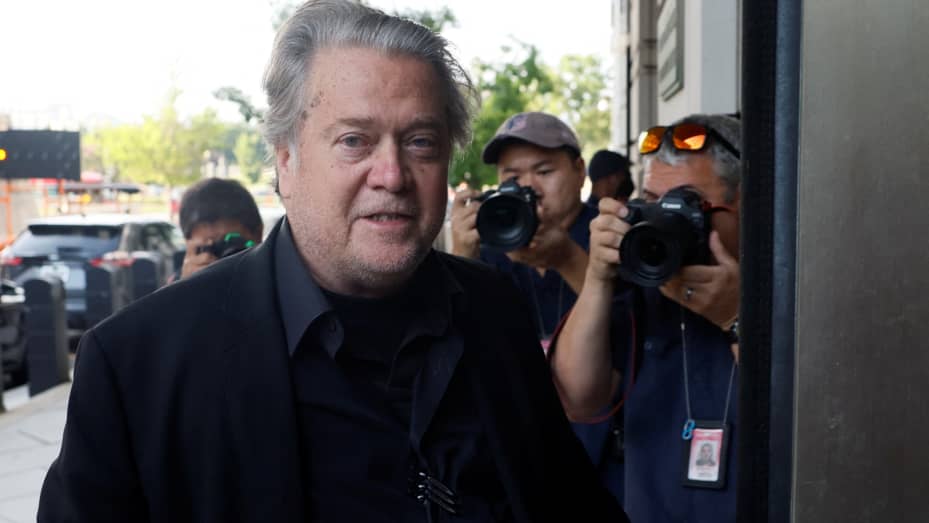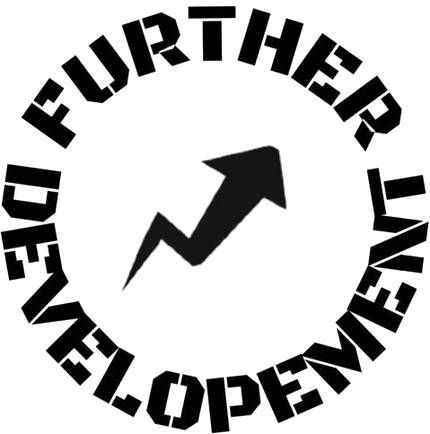
Former Trump official Steve Bannon was convicted of being in contempt of Congress after refusing to provide documents to the January 6th committee
Former Trump White House aide Steve Bannon was found guilty Friday of two counts of contempt of Congress after a trial in federal court in Washington, D.C.
Jurors deliberated for less than three hours before convicting Bannon of willfully failing to comply with subpoenas demanding his testimony and records, which were issued last September by the House select committee investigating the Jan. 6, 2021, riot at the U.S. Capitol by supporters of then-President Donald Trump.
He faces a minimum punishment of 30 days in jail and a maximum of one year when he is sentenced on Oct. 21. He also faces a fine in the range of $100 to a maximum of $100,000.
“The subpoena to Stephen Bannon was not an invitation that could be rejected or ignored,” said Matthew Graves, the United States Attorney for the District of Columbia.
“Mr. Bannon had an obligation to appear before the House Select Committee to give testimony and provide documents. His refusal to do so was deliberate, and now a jury has found that he must pay the consequences.”

“We respect their decision,” Bannon, 68, said outside of the E. Barrett Prettyman Courthouse, referring to the jurors at his trial.
“We may have lost a battle here today, but we’re not going to lose this war,” Bannon said. “I stand with Trump and the Constitution, and I will never back off that, ever.”
Bannon plans to appeal his conviction, which came a day after the Jan. 6 committee held a public hearing that featured evidence that included his own words.
The committee played an audio clip of Bannon, speaking to a group of people on Oct. 31, 2020, days before the presidential election, in which he said that Trump would claim to have won the White House race regardless of the actual results.
“What Trump’s gonna do is just declare victory. Right? He’s gonna declare victory. But that doesn’t mean he’s a winner,” Bannon said. “He’s just gonna say he’s a winner.
That is exactly what Trump did for weeks after losing both the popular election vote and the Electoral College vote to President Joe Biden.
On Jan. 5, 2021, the eve of Congress holding a joint session to confirm Biden’s Electoral College victory, Bannon spoke to Trump on the phone for 11 minutes, and then went on a radio show where he made a dark prediction.
“All hell is going to break loose tomorrow,” Bannon said on that show. “It’s all converging, and now we’re on, as they say, the point of attack.”
“I’ll tell you this: It’s not going to happen like you think it’s going to happen,” he said. “It’s going to be quite extraordinarily different, and all I can say is strap in.”
The next day, thousands of Trump supporters who believed he had won the election besieged the Capitol, with hundreds of them swarming through the halls of Congress, disrupting for hours the session confirming the official results.
The leaders of the Jan. 6 committee lauded the jury’s decision Friday.
“The conviction of Steve Bannon is a victory for the rule of law and an important affirmation of the Select Committee’s work,” Rep. Bennie Thompson, the Mississippi Democrat who is chair of the Jan. 6 committee, and Vice Chair Liz Cheney, R-Wyo., said in a joint statement Friday afternoon.
“As the prosecutor stated, Steve Bannon ‘chose allegiance to Donald Trump over compliance with the law.’ Just as there must be accountability for all those responsible for the events of January 6th, anyone who obstructs our investigation into these matters should face consequences. No one is above the law,” Thompson and Cheney said.
Bannon had served as chief strategist and counselor to Trump for about a half-year before being ousted in mid-2017. Since then, however, he has been an ardent backer of the ex-president and the so-called MAGA — “Make America Great Again” — movement.
Two weeks after the Capitol riot, on his last night as president, Trump issued dozens of pardons, including one to Bannon, who had been criminally charged in federal court in New York with swindling donors in a purported effort to build a wall on the U.S. border with Mexico.
Prosecutors in that case said Bannon received $1 million in funds from the We Build the Wall group, and diverted that money to a separate nonprofit he had already created, whose ostensible purpose was “promoting economic nationalism and American sovereignty.”
In her closing arguments Friday morning at Bannon’s contempt trial, assistant U.S. Attorney Molly Gaston told jurors he “chose allegiance to Donald Trump over compliance with the law” by refusing to appear for testimony and give documents to the Jan. 6 committee.
“When it really comes down to it, he did not want to recognize Congress’ authority or play by the government’s rules,” Gaston said. “Our government only works if people show up. It only works if people play by the rules. And it only works if people are held accountable when they do not.”
Bannon’s lawyers did not present a defense during the trial, which began Monday with jury selection.
His attorneys were hamstrung by pretrial rulings by the judge in the case, who severely limited the evidence they could present at trial.
During his own closing arguments Friday, Bannon’s lawyer Evan Corcoran tried to suggest that Thompson did not sign a subpoena for Bannon, NBC reported. Corcoran dropped that line of argument after the prosecution objected.
Corcoran also asked jurors to set aside memories of Jan. 6 in their deliberations.
“None of us will soon forget January 6, 2021,” Corcoran said. “It’s part of our collective memory. But there’s no evidence in this case that Steve Bannon was involved at all. For purposes of this case we have to put out of our thoughts January 6.”
Jurors began their deliberations just before 11:40 a.m. ET, after closing arguments concluded. The verdicts were read out in court at around 2:50 p.m. ET.
Another former Trump aide, the trade advisor Peter Navarro, was arrested in early June on charges identical to the ones that Bannon was convicted of.
Navarro failed to appear to testify on March 2 in response to the subpoena from the House panel and also failed to produce by Feb. 23 the documents sought by that same subpoena, according to the indictment issued by a grand jury in Washington federal court.
By: Dan Mangan




